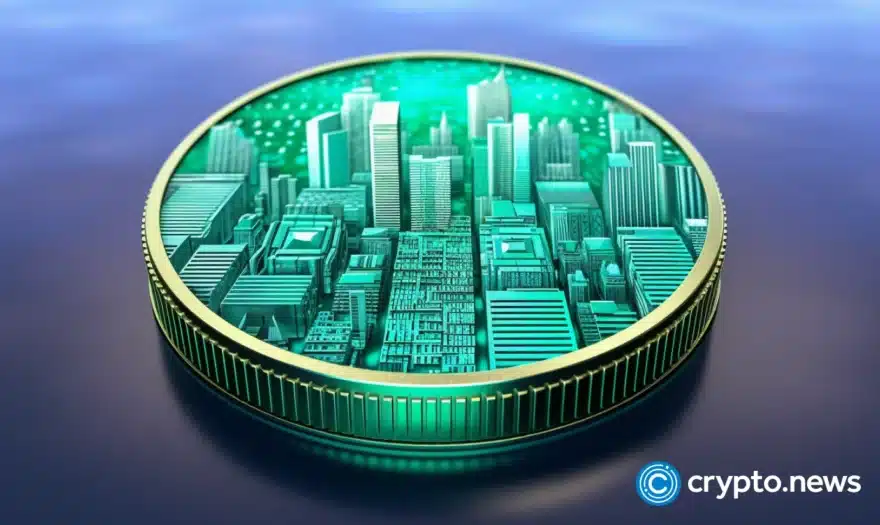Financing infrastructure for a sustainable future: a blockchain solution

Infrastructure is essential. From power plants to transport facilities, healthcare centers, and telecommunication networks, infrastructure supports society to function and the economy to thrive. Quality infrastructure investments promote economic growth and reduce climate change.
Even though infrastructure lies at the nexus of economic, social, and environmental prosperity, there needs to be a greater balance between the demand for infrastructure investment and the supply of available financing in developed and developing countries.
The G20-backed Global Infrastructure Hub estimates that $94t in infrastructure investments will be needed during the next 20 years. The World Economic Forum forecasts that the world will face a $15t infrastructure financing gap by 2040. As the world is seeking to accomplish ambitious goals, such as the Sustainable Development Goals (SDGs) by 2030 and net zero emissions by 2050, the demand for quality infrastructure investments will only increase in the post-pandemic era.
Public funds have historically been the major sources of infrastructure finance. The ongoing COVID-19 pandemic, high inflation, and tighter financial regulations (e.g., Basel III) have significantly restrained government spending on infrastructure.
Scaling up private finance through public-private partnerships (PPPs) is crucial for bridging the widening infrastructure gap. However, the high financing costs and inappropriate risk-return profiles caused by existing infrastructure financing mechanisms hinder broader private-sector participation.
If anything, pioneering thinking and innovative infrastructure financing approaches will be required to optimize public spending, mobilize private resources, and, more importantly, realize inclusive and sustainable growth.
Since the advent of Bitcoin in 2009, its underlying technology – blockchain – has drawn the public’s attention as the next-generation technology disrupting industries. Blockchains employ algorithmic and cryptographic methods to manage data across participants in peer-to-peer (P2P) networks. The immutable and decentralized features of blockchain bring efficiency gains, such as cost reductions, transparency, programmability, and automation.
Over the last decade, blockchain has generated new business opportunities and caused major shifts in the financial sector. Building on the blockchain, tokenization enables the conversion of assets and rights into digital tokens, which are easily tradable, divisible, and tracked. In theory, any assets or rights can be tokenized and represented on blockchains.
Tokenization builds connections between the off-chain and on-chain worlds, where efficiencies of value exchange and information management are expected to be notably improved. With the support of blockchain-enabled tokenization, innovative financial strategies can be developed to address some challenges existing infrastructure financing mechanisms face and better achieve sustainable goals. Some potential benefits brought by tokenization are discussed as follows.
Democratization
By tokenizing infrastructure assets into small-value tokens representing fractional ownership, investing in infrastructure with small budgets becomes financially viable.
The lowered investment barriers would attract small investors, including individual and small and medium-sized enterprises (SME) investors, who were historically excluded from direct infrastructure investing.
For the first time, surrounding community residents of a project are offered opportunities to actively participate in project development and financing.
Tokenization creates a sense of ownership in infrastructure facilities, which provides a solution to galvanize social acceptance. With government support, tokenization can be used to improve affordability, especially for low-income and unbanked individuals, to promote inclusiveness and address inequality issues.
Liquidity
Tokens backed by infrastructure assets are exchanged in a peer-to-peer (P2P) manner and traded among investors in secondary markets 24 hours a day, seven days a week. P2P transfers allow global participants, developers, and investors, to connect easily and make transactions.
Liquid secondary markets enable investors to quickly offload their investments in infrastructure from their balance sheets and mitigate liquidity gaps. The growing derivative markets of tokenized assets give investors more access to hedge investments and manage risks.
Bankability
Tokens are governed and executed through smart contracts, which are software algorithms with trigger actions based on predefined parameters. Smart contract automation reduces administrative burdens and the number of intermediaries engaged in the process.
Disintermediation results in faster execution and significant cost reductions, improving project bankability, especially small-scale projects. Community-level infrastructure that does not justify costs in the conventional financing system is offered more financing options through tokenization.
Enhanced bankability makes the risk-return profile of infrastructure projects better meets investors’ criteria. Therefore, more infrastructure can be constructed to serve people and society.
Transparency
Transactional information of tokens is immutably stored on permissionless blockchains. Any internet user can access on-chain data in real-time.
With the support of Internet of Things (IoT) devices, financial and operational data are automatically recorded and stored on blockchains. Critical stakeholders, such as regulators, project developers, investors, and even surrounding communities, can review timely and acute information on projects.
The unprecedented granularity and scale of data significantly simplify due diligence and improve decision-making.
Impact
With proper design and government support, non-financial impacts can be converted into investable tokens, which creates new economic and business models. Tokenization of positive social and environmental impacts stimulates the consumption of sustainable services and goods by providing financial incentives to investors and customers.
As a result, the profitability and bankability of projects are improved. Through tokenization, growing interest in impact investing is connected with high-impact infrastructure development. As a result, new funding streams are unleashed, facilitating a sustainability transition.
Although blockchain-enabled tokenization could drive substantial efficiency gains in infrastructure financing, the nascent technology needs to overcome numerous regulatory and technological obstacles. In most jurisdictions, the outlook for regulations supporting asset tokenization is unpredictable and short-term.
Foreseeable and stable policies foster a transparent and collaborative environment to strengthen the private sector’s commitment. Widespread adoption of tokenization-enabled financial solutions requires the resolution of technical challenges around scalability and interoperability. The key to success is solid business rationales for decentralization and the blockchain. Multidisciplinary and international cooperation and coordination across public and private sectors are indispensable for continuously developing the technology and its applications in infrastructure.
Infrastructure is essential to economic growth, societal resilience, and environmental sustainability. Tokenization-enabled financing could make infrastructure, as a new asset class, more appealing by reducing financing costs, enlarging the investor base, improving investment liquidity, and promoting sustainable consumption with the support of blockchain technology.
With innovative thinking and bold actions, new waves of financing and novel forms of partnerships will be unchained. Once the potential risks and barriers to the broader application are carefully examined and mitigated, tokenization can be leveraged to transform infrastructure financing and achieve sustainability goals.
Disclosure: This content is provided by a third party. crypto.news does not endorse any product mentioned on this page. Users must do their own research before taking any actions related to the company.














